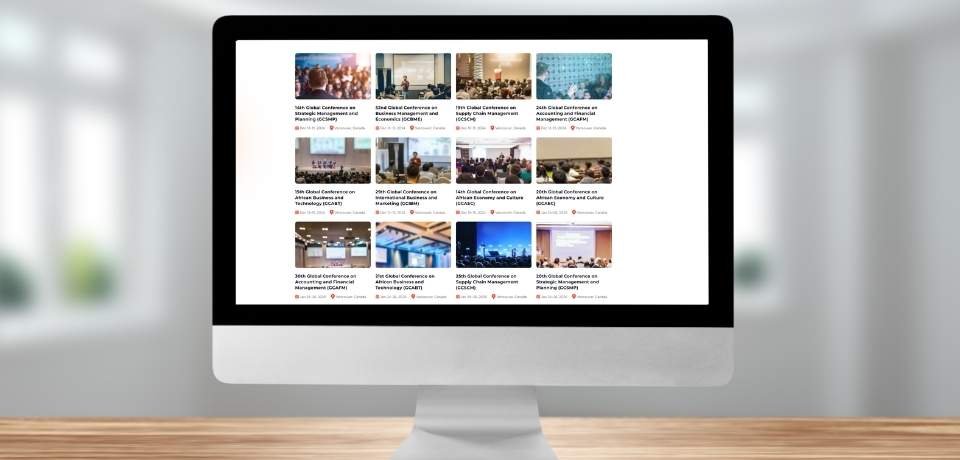Attending the right business conference can have a profound impact on your career. Picture yourself surrounded by industry leaders, gaining insights that could impact your professional development. However, with countless options available, making the right choice can feel challenging. So, how to select a business conference to attend?
To select a business conference, define your goals, research relevant events, assess the agenda and speakers, consider location and costs, and check for networking opportunities and reviews to ensure the best fit.
Curious to learn more? This article will walk you through essential tips and strategies to help you confidently figure out your options and make the most of your conference experience.
What is the Value of Attending Business Conferences?
Business conferences offer numerous benefits that can strengthen your professional development. First and foremost, they provide valuable networking opportunities. Meeting like-minded professionals, industry leaders, and potential partners can lead to collaborations and business ventures.

In addition, conferences allow attendees to share knowledge and insights, promoting a culture of learning and innovation. For instance, attending international business conferences in Canada can further expand your network on a global scale. These conferences can help you stay updated on industry trends.
The world of business is always developing, and conferences often feature discussions on the latest developments. By participating, you gain firsthand knowledge from experts and have the chance to ask questions. This information can be crucial for making informed decisions in your career.
How to Select a Business Conference to Attend? (Step-by-Step Guide)
Selecting the right business conference is crucial for maximizing your investment in time and money. Follow this step-by-step guide to make an informed choice.

Step 1: Define Your Goals
Start by identifying your objectives for attending the conference. Do you want to learn new skills, network with industry leaders, or explore new business opportunities? Clearly outlining your goals will help narrow down your options.
Step 2: Research Available Conferences
Utilize various online resources to gather a list of relevant conferences. Focus on platforms that feature upcoming events relevant to your industry. Seek out conferences that align with your professional goals and interests for a more fulfilling and targeted experience.
Step 3: Analyze Conference Relevance
Assess whether the conference topics align with your career aspirations. Check the agenda to ensure the sessions and workshops cover areas you want to learn about. If the topics don’t align, it may not be worth your time.
Step 4: Consider the Location
The venue plays a significant role in your experience. When choosing the right business conference, consider whether you prefer attending a local event or traveling to a different city. Additionally, think about the accessibility of the location and whether it’s convenient for you.
Step 5: Check the Speaker Lineup
The quality of speakers can greatly improve your experience. Research the backgrounds of the speakers and their relevance to your industry. Having respected experts can ensure you receive high-quality information.
Step 6: Look for Networking Opportunities
Conferences should offer ample networking chances. Check for scheduled networking events, workshops, and breakout sessions. These activities encourage meaningful connections and collaborations with other attendees.
Step 7: Examine the Cost
Understand the financial implications of attending a conference. Look at registration fees, travel expenses, and accommodation costs. Ensure that the benefits of attending outweigh the costs involved.
Step 8: Seek Reviews and Feedback
Before finalizing your decision, look for reviews from past attendees. Their experiences can provide valuable insights into the conference’s overall quality and effectiveness. You can often find reviews on social media or industry forums.
Step 9: Plan Your Itinerary
Once you’ve selected a conference, plan your schedule in advance. Identify sessions that align with your goals and ensure you allocate time for networking. Having a clear plan will help you make the most of your time at the event.
Step 10: Prepare for Attendance
Prepare yourself for the conference. Bring necessary materials like business cards and a notepad. Being prepared will help you engage more effectively and maximize your learning experience.
Following these steps will help you confidently answer the question of how to select a business conference to attend. By taking the time to research and plan, you can ensure that your choice aligns with your professional objectives.
How to Identify Your Goals for Attending a Conference?
Before attending any business conference, you should clarify your objectives. Knowing what you aim to achieve will guide your decision-making process and enhance your overall experience. Here are some effective ways to identify your goals for attending a conference:
Reflect on Your Current Career Stage
Take a moment to assess where you are in your career. Are you looking to learn new skills, expand your network, or explore potential job opportunities? Knowing your career stage can help shape your goals for the conference.
Consider Your Professional Development
Think about the skills you want to develop or improve. Do you need training in a specific area, such as digital marketing or project management? Identifying gaps in your knowledge will help you select relevant sessions at the conference.
Set Networking Objectives
Networking is often a significant reason for attending conferences. Identify the types of connections you want to make. Are you looking to meet industry leaders, potential clients, or peers? Setting specific networking goals will help you approach the event strategically.
Align Goals with Industry Trends
Stay informed about current trends in your industry. Being aware of what is relevant and sought-after can help you tailor your goals. Consider how you can make use of the knowledge gained at the conference to stay ahead in your field.
Think About Long-Term Aspirations
Reflect on your long-term career aspirations. How can attending this conference help you achieve those goals? Whether it’s gaining industry insights or developing relationships, aligning your conference objectives with your future aspirations is crucial.
Create a List of Specific Goals
Write down your goals in a clear and concise manner. Having a written list can serve as a reminder and guide throughout the conference. Review your goals before and during the event to ensure you stay focused.
Prioritize Your Goals
Not all goals carry the same weight. Identify which goals are most important to you. Prioritizing will help you allocate your time and energy effectively during the conference.
Considering Success After the Conference
Consider how you will measure the success of your goals after the event. Will it be through new connections made, knowledge gained, or projects initiated? Defining your success criteria can help you assess the value of your attendance.
By thoughtfully identifying your goals for attending a conference, you can maximize your experience and maximize the benefits. This clarity will guide you in selecting sessions and networking opportunities that align with your aspirations.
What Are the Different Types of Business Conferences?
Business conferences come in various formats, each designed to meet to different needs and interests. Being familiar with the different types can help you choose the most suitable event for your goals. Here are some common types of business conferences:
Industry Conferences
These events bring together professionals from a specific industry, such as technology, healthcare, or finance. Industry conferences focus on the latest trends, challenges, and innovations within that sector. They often feature expert speakers and panel discussions.
Trade Shows
Trade shows are exhibitions where businesses showcase their products and services. These events provide opportunities for networking and exploring new solutions. Attendees can engage with exhibitors, learn about industry advancements, and discover potential business partners.
Workshops and Seminars
These smaller, interactive events focus on specific skills or topics. Workshops typically involve hands-on activities and group discussions, while seminars may feature expert presentations. They are ideal for those seeking in-depth learning experiences.
Networking Events
Networking-focused conferences are designed to facilitate connections among attendees. These events may include structured networking sessions, breakout groups, and informal gatherings. They provide an excellent opportunity to meet industry peers and build relationships.
Annual Conferences
Many organizations host annual conferences that cover a broad range of topics relevant to their members. These conferences often feature keynote speakers, workshops, and networking opportunities. They serve as a platform for sharing industry knowledge and best practices.
Leadership Conferences
These events focus on developing leadership skills and strategies. Attendees often include managers, executives, and aspiring leaders. Leadership conferences typically feature renowned speakers and sessions on effective management practices.
Virtual Conferences
With the rise of technology, many conferences now offer virtual attendance options. Virtual conferences allow attendees to participate from anywhere, often at a lower cost. They can include live-streamed sessions, online networking, and digital resources.
Webinars
While not traditional conferences, webinars are online seminars that focus on specific topics. They provide valuable information and often feature expert speakers. Webinars are a convenient way to gain insights without the need for travel.
By familiarizing yourself with the various types of business conferences, you can select the one that best aligns with your professional goals and interests. Each type offers unique experiences and opportunities for growth.
Tips for Making the Most of Your Conference Attendance
Attending a conference can be an incredible opportunity for growth, networking, and learning. To truly maximize your experience, consider these practical tips that will help you make the most of your time at the event.
- Plan Your Schedule: Review the conference agenda ahead of time and choose sessions that align with your interests and goals. Planning your day will ensure you don’t miss out on valuable insights.
- Engage with Speakers: Don’t hesitate to ask questions during sessions. Engaging with speakers can deepen your knowledge and help you gain additional insights.
- Network Actively: Take advantage of breaks and networking events to connect with other attendees. Approach people with a friendly demeanor and be open to conversations.
- Utilize Social Media: Many conferences have dedicated hashtags. Engage in discussions online by sharing your thoughts and insights. This can help you connect with fellow attendees and expand your network.
- Take Notes: Bring a notebook or use your device to jot down key points from sessions. Capturing insights as they happen will help reinforce your learning.
- Follow-up: After the conference, reach out to the contacts you made. A simple message expressing appreciation for their time can go a long way in building lasting relationships.
- Share Your Experience: Discuss what you learned with colleagues or share insights on social media. Sharing knowledge not only reinforces your understanding but positions you as a resource in your network.
- Reflect on Your Experience: Take time after the conference to think about what went well and what could be improved for next time. This self-reflection will help you plan for future events more effectively.
By incorporating these tips, you’ll not only improve your conference experience but also build valuable connections and knowledge that can benefit your career.
What to Do After Attending a Conference?
After attending a business conference, take steps to solidify the experience and ensure long-term benefits. Here’s what you should do once the event is over.

Review Your Notes
Take some time to go through the notes you took during the conference. Highlight key points and actionable insights that you want to implement. This will reinforce your learning and help you remember essential information.
Connect with New Contacts
Follow up with the people you met at the conference. Send personalized emails expressing your appreciation for their time. Building on these connections can lead to future collaborations or mentorship opportunities. Acknowledging the value of business conferences for startups can also help you make the most of these relationships effectively.
Share Insights with Your Team
If applicable, share your experiences and key takeaways with your colleagues. Conduct a short presentation or write an email summarizing what you learned. This can benefit your team and spark discussions on relevant topics.
Implement What You Learned
Identify actionable steps based on the insights you gained. Whether it’s adopting new strategies or sharing resources with your team, applying your newfound knowledge is crucial for long-term impact.
Analyze the Conference Experience
Reflect on your overall experience at the conference. What did you find valuable? What could have been improved? This self-assessment will help you make better choices for future events.
Stay Engaged on Social Media
Continue engaging with the speakers and attendees on social media. Join discussions or comment on posts related to the conference. This ongoing engagement can help you stay connected and expand your network.
Plan for Future Conferences
Use the insights from this conference to plan for future attendance. Consider what worked well and what you would like to do differently next time. This proactive approach will enhance your conference experiences.
By taking these steps after attending a business conference, you can maximize the value of your experience. Reflecting on your learnings and maintaining connections will support your ongoing professional development.
Frequently Asked Questions (FAQs)
Here are some frequently asked questions related to how to select a business conference to attend.
What Conference Should I Attend if I’m New to My Industry?
Research industry-specific events that cater to newcomers. Look for conferences that offer beginner-friendly sessions and networking opportunities. These will help you build foundational knowledge and establish connections within your field.
What Are the Benefits of Attending Virtual Conferences?
Virtual conferences allow you to participate from anywhere, often at lower costs. They provide access to diverse speakers and sessions without travel stress. Additionally, you can often revisit recorded sessions, enhancing your learning experience.
Is It Possible to Attend Business Conferences on a Limited Budget?
Yes, look for local or regional conferences that minimize travel costs. Many organizations also offer discounts for early registration. Consider virtual events that typically have lower fees while still providing valuable content.
Is It Worth Attending Conferences in Different Industries?
Yes! Attending conferences outside your industry can provide fresh perspectives and ideas. They often feature innovative practices that you can adapt to your field. Networking with professionals from different backgrounds can also spark new opportunities.
How to Prepare for Networking at a Conference?
Research attendees and speakers beforehand to identify key people to connect with. Prepare your elevator pitch and have business cards ready. Practice active listening and be open to engaging in meaningful conversations during the event.
Bottom Lines
Choosing the right business conference will have a significant impact on your professional development. Knowing how to select a business conference to attend is essential for maximizing your time and investment. Your experience can open doors to new opportunities and connections.
Take the time to define your goals, explore various options, and consider the details that matter most to you. Whether it’s the location, speaker lineup, or networking opportunities, each factor plays a crucial role in your decision.
Attending the right conference can boost your career and inspire new ideas. Take part in the process of choosing wisely, and you’ll set the stage for an enriching experience that aligns with your aspirations.